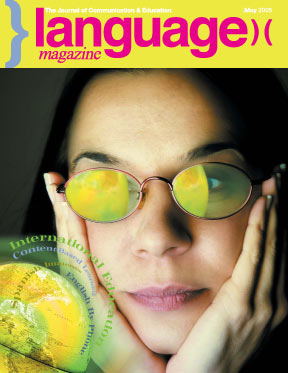Study in Security

This issue contains our annual focus on international education to coincide with the NAFSA: Association of International Educators’ convention in Seattle. This subject is very dear to my heart since I was fortunate enough to study at universities in Spain and France — experiences which completely changed not only my outlook,
but the course of my life.
Promoting the international exchange of students is probably the most practical and economical method of fostering global understanding, and the fact that the percentage of American college students studying abroad is higher than ever (see page 16) is welcome, however it remains only a tiny percentage of the total student body in an era when it is generally recognized that global understanding is the key to economic success. We must do all we can to encourage young American “ambassadors” to show the rest of the world that we all share the same values, fears and hopes. Educational institutions are doing their bit by establishing alliances and creating exciting new programs, but it is the future employers of these students who really hold sway. Major employers of college graduates should formulate a policy of giving preference to candidates who have demonstrated their commitment to globalization by participating in a study abroad program.
On the other side of the coin, the number of international students in the U.S. has fallen for the first time in 30 years. America is the natural choice as a study destination for young people the world over. It is still regarded as the land of opportunity, its educational institutions have a reputation second to none and its diversity of people, landscape and climate provide prospective students with unparalleled choice. But we cannot rest on our laurels and presume that they will carry on coming no matter how we treat them.
Many IEPs (Intensive English Programs) are experiencing a severe decline in student numbers and some have already had to close through lack of registrations. These programs are more likely to be affected by short term fluctuations than degree programs and registration figures may well bounce back as soon as fears are allayed, but the trend should not be ignored.
While many of our readers and forward-thinking legislators are working hard to restore the image of America as a tolerant and welcoming society in the wake of our government’s unilateral stance, more obstacles are being created.
The appointment of John Bolton as the U.S. Ambassador to the United Nations would send the wrong message to prospective international students. His disregard for international cooperation is clear through statements such as “there is no United Nations,” just an international community that occasionally “can be led by the only real power left in the world — and that’s the United States” or his infamous line that: “If the U.N. secretariat building in New York lost 10 storys, it wouldn’t make a bit of difference.”
Educators and business can only do so much to safeguard our futures through the preservation of America’s reputation as a welcoming, tolerant society; the rest is up to our government which must wake up to the reality that is global interdependence.
IN THIS ISSUE:
2005 / The Year of Languages
NAFSA
NAFSA, the Association of International Educators, on its 2005 public policy priorities
Taking Spanish to New Heights
Nancy Zarenda discovers why Lake Tahoe’s Summer Spanish Institute has been so successful
Contented Learning
Randi Harlev examines how content-based learning can help English Language Learners close the achievement gap
Telephone Language Learning
Steven Donahue tests an innovative learning strategy using a common telephone and automatic speech recognition
Spanish Quest
Hannah Zeiler seeks out the hottest
language learning spots in Spain
Immersed in Mexico
Emilia Lohrman recommends top destinations
in Mexico for Spanish immersion programs
Last Writes
Richard Lederer presents no harmless drudge


